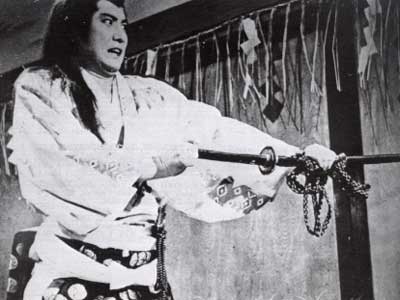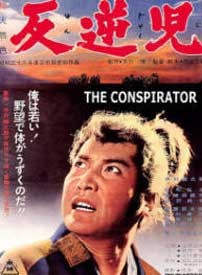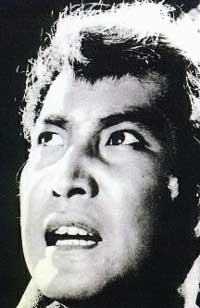During an era of civil wars, in the 7th year of Tenso, Yoshimoto Imagawa was overthrown by Oda Nobunaga with the help of Ieyasu Tokugawa. Ieyasu's wife, Lady Tsukiyama, was of the ruined Imagawa clan. She was basically abandoned by Ieyasu lest his fealty with Oda Nobunaga be doubted. Ieyasu's son, half Tokugawa & half Imagawa, was married to Oda's first daughter Tokumine Gozen, to further assure Oda that there would be no attempt at revenge over the downfall of the Imagawa clan.
 This scenario from history is the starting point for Daisuke Ito's Conspirator (Hangyakuji, Toei, 1961), from a script by Jiro Osaraji. The Japanese title means "one who conspires or rebels" or & has alternatively been rendered Rebellious Son, but really the conspirator is this son's entire family, & the title is ultimately an ironic one, since it is a son's decency & humane feeling that becomes the equivalent of treachery in a setting where humanity has no place. Thus Ieyasu's son is conspired against while being treated as though her were the conspirator. This scenario from history is the starting point for Daisuke Ito's Conspirator (Hangyakuji, Toei, 1961), from a script by Jiro Osaraji. The Japanese title means "one who conspires or rebels" or & has alternatively been rendered Rebellious Son, but really the conspirator is this son's entire family, & the title is ultimately an ironic one, since it is a son's decency & humane feeling that becomes the equivalent of treachery in a setting where humanity has no place. Thus Ieyasu's son is conspired against while being treated as though her were the conspirator.
The supporting cast includes Haruko Sugimura, Kaneko Iwasaki, Noriko Kitazawa, Hiroko Sakuramachi, Chinyosuke Azuma & Shugu Sano. Kinnosuke Nakamura stars Nobuyasu the son of Ieyasu Tokugawa & Lady Tsukiyama.
In a "head inspecting" sequence early in the tale, the film shows us the beginnings of Lady Tsukiyama's thirst for revenge against Oda Nobunaga, her fallen family's enemy, as well as against Ieyasu the husband who abandoned her, & even against Tokuhime Gozen who threatens a mother's control over her son.
Lady Tsukiyama becomes a veritable arch-fiend in this story, practicing witchcraft & intrigue to plot against everyone she considers her foe, ultimately causing her own downfall & the downfall of her trapped, innocent son, whose well-being is the concern of absolutely no one.
Nobuyasu admits that his mother's machinations are evil & he would kill her except she is his mother. He thinks Ieyasu has been a villain, too, & would kill him except for loving a father as a son must. Caught between the two, he says repeatedly that he "stands between walls" with no way of escaping.
[SPOILER ALERT] Kinnosuke's portrayal of Nobuyasu is deeply emotional. He is the perfect, ideal samurai, of a sort that scarsely exists. Decent samurai are such a rarity that his purity is easily turned against him by opposing interests on all sides. Ultimately he is sacrifed by his own father, ordered to commit seppuku for the sake of the future of the Tokugawa family.
The final sequence is the most grisly seppuku scene outside of Kobayashi's Harakiri (1964), not for matching Kobayashi's film in graphic goriness, but for the painful compassion this act evokes in the viewer.
Nobuyasu is valliant even in his final act, but his retainers, raised with him to be like brothers, haven't the heart or stamina to behead their beloved young lord, thus leaving him to sit with his guts torn open waiting & waiting for the beheading. The first retainer cannot do it at all & ends up throwing sword away & begging forgiveness from his agonized dying lord. The second retainer swings once & fails to cut all the way through, forcing Nobuyasu to beg him to be less "flurried" & help him die with dignity.
This is a long way from the idealized act of seppuku as performed at the end of various versions of Chushingura (The 47 Ronin), or at the beginning of Bushido Samurai Saga Bushido zankkoku monogatari, 1963) wherein Kinnosuke gives a more narrowly heroic reenactment of self-immolation. [END SPOILER ALERT]
More than most of Daisuke Ito's anti-feudal films, this ones does enoble at least one samurai, but does so in an anti-romantic context. Cruel men of the warrior class excel; good men are destroyed.
Nobuyasu is introduced in an early scene as an invicible young warrior & tactician in a grand-scale battle. Thereafter the character provides Kinnosuke Nakamura the chance for an actor's tour de force of emotional response. He emotes love, agony, anger, frustration, confusion, never for a moment losing his character's raw & naive honesty.
 The beauty of his performance is epitomized not in his warrior's prowess or his pitiful demise such as frame the film, but in a sequence wherein he dances for Ieyasu & Nobunaga. It is a gorgeous, vibrant, & dramatic dance with fan & bow, while his handsome retainers sing the film's anthem, "Death is destiny. Men must die." It is sung with manly pride in the early scene. It is sung with misery in the end. The beauty of his performance is epitomized not in his warrior's prowess or his pitiful demise such as frame the film, but in a sequence wherein he dances for Ieyasu & Nobunaga. It is a gorgeous, vibrant, & dramatic dance with fan & bow, while his handsome retainers sing the film's anthem, "Death is destiny. Men must die." It is sung with manly pride in the early scene. It is sung with misery in the end.
Ito is usually interested in the position of peasants his period films, but this time he focuses all but exclusively on the upper echelons of the samurai class. The one peasant character we encounter is the maid Shino who Nobuyasu meets by chance & is attracted to. Lady Tsukiyama learns of this flirtation & has Shino brought to the castle & given the name Kozasa, for names are always changed when coming to a court to work or serve. Lady Tsukiyama's purpose, however, is merely to insult Tokuhime Gozen.
When Nobuyasu rejects Shino out of respect for his wife, he does not know that his mother will beat the girl near to death or that Shino will in consequence assist in plots against Lady Tsukiyama. In an emotional scene when Nobuyasu admits to his mother that he would kill her if he weren't her son, then says that he will instead kill anyone who tries to harm her. Thus his sword stabs through a screen behind which lurks Shino.
This act seen within the context of most of Ito's films tells us that the only pure hero of the film, Nobuyasu, is nevertheless a samurai, therefore no less callous than a villain when it comes to the summary slaying of a peasant. He can kill even a girl he liked a great deal, even when her involvement was the fault of himself for having seduced her; the fault of his mother for having brutalized her; & the fault of his wife who had in turn used the peasant girl against the cruel mother-in-law. A girl who once grew flowers with her mother & lived a good life on the land was drawn against her will into the world of the samurai, & was destroyed by it.
The soundtrack by Tamekichi Mochizuki, who also scored the Mizoguchi classics Sansho the Bailiff (1954) & Ugetsu monogatori (1953), is painfully sad, underscoring scenes of violence & scenes of emotional turmoil with sustained bass notes.
copyright © by Paghat the Ratgirl
|

 This scenario from history is the starting point for Daisuke Ito's Conspirator (Hangyakuji, Toei, 1961), from a script by Jiro Osaraji. The Japanese title means "one who conspires or rebels" or & has alternatively been rendered Rebellious Son, but really the conspirator is this son's entire family, & the title is ultimately an ironic one, since it is a son's decency & humane feeling that becomes the equivalent of treachery in a setting where humanity has no place. Thus Ieyasu's son is conspired against while being treated as though her were the conspirator.
This scenario from history is the starting point for Daisuke Ito's Conspirator (Hangyakuji, Toei, 1961), from a script by Jiro Osaraji. The Japanese title means "one who conspires or rebels" or & has alternatively been rendered Rebellious Son, but really the conspirator is this son's entire family, & the title is ultimately an ironic one, since it is a son's decency & humane feeling that becomes the equivalent of treachery in a setting where humanity has no place. Thus Ieyasu's son is conspired against while being treated as though her were the conspirator. The beauty of his performance is epitomized not in his warrior's prowess or his pitiful demise such as frame the film, but in a sequence wherein he dances for Ieyasu & Nobunaga. It is a gorgeous, vibrant, & dramatic dance with fan & bow, while his handsome retainers sing the film's anthem, "Death is destiny. Men must die." It is sung with manly pride in the early scene. It is sung with misery in the end.
The beauty of his performance is epitomized not in his warrior's prowess or his pitiful demise such as frame the film, but in a sequence wherein he dances for Ieyasu & Nobunaga. It is a gorgeous, vibrant, & dramatic dance with fan & bow, while his handsome retainers sing the film's anthem, "Death is destiny. Men must die." It is sung with manly pride in the early scene. It is sung with misery in the end.